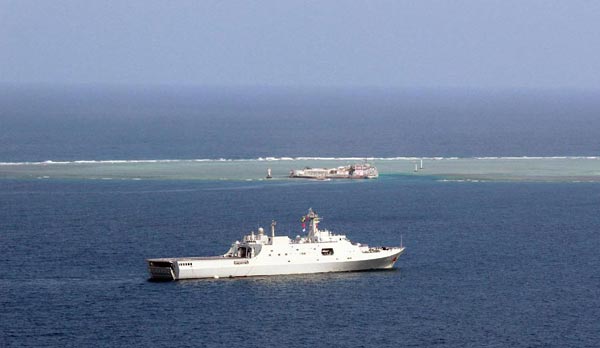Dual track right course in the South China Sea
Updated: 2015-08-05 07:54
(China Daily)
|
||||||||
 |
|
A formation of the Nanhai Fleet of China's Navy on Saturday finished a three-day patrol of the Nansha islands in the South China Sea. [Photo/Xinhua] |
Foreign Minister Wang Yi once again stressed a dual-track approach to resolve the South China Sea disputes. Such an approach, namely direct negotiations between disputing parties and joint efforts to maintain peace and stability, is built on consensus between China and the Association of Southeast Asian Nations.
Wang's remarks, made in Singapore on Monday ahead of the regional security talks in Kuala Lumpur, drive home the message that the disputes should be directly resolved between China and claimant parties through peaceful negotiations, and any attempt to enlist support from outside forces or deviate from the disputes themselves will be counterproductive.
The focus of the South China Sea issue, as Wang pointed out, is the territorial disputes triggered by the illegal occupation of the islands and reefs that belong to China's Nansha Islands. But countries such as the Philippines and the United States have questioned China's nine-dash line, in an attempt to divert attention away from the disputes.
Raising the issue of the nine-dash line, which was officially promulgated by China in the 1940s and upheld by the successive Chinese governments since, will merely heighten confrontation.
And calls for the countries involved in the disputes to freeze their island building and reclamation activities are unrealistic, and as Wang noted "will not work in practice".
China and ASEAN have the political will and confidence to push for negotiations among the parties directly concerned in the disputes.
Since 2013, the two have held rounds of consultations to negotiate a Code of Conduct in order to implement the Declaration on the Conduct of Parties in the South China Sea, and measurable progress has already been achieved.
During the ninth China-ASEAN senior officials' meeting in Tianjin a few days ago, diplomats agreed to set up two hotline platforms between China and ASEAN countries. These will focus on maritime search and rescue in response to maritime emergencies, and are an encouraging sign that the spirit of cooperation outweighs the will for confrontation in the region.
Confrontational moves and stances will only disrupt the negotiations between China and ASEAN on a Code of Conduct for the South China Sea. And meddling by outside forces, such as the US, will further complicate the situation and poison the atmosphere for peaceful negotiations.
Parties which have a stake in peace and stability in the South China Sea should refrain from making provocative moves and cultivate a good atmosphere so that a Code of Conduct can be drawn up at an early date.

 Tsingtao gets ready for huge beer festival in China
Tsingtao gets ready for huge beer festival in China
 Stunning Shu brocade and embroidery techniques
Stunning Shu brocade and embroidery techniques
 Kazan games: Diving in the sky
Kazan games: Diving in the sky
 Torrential rain wreaks havoc in Jinan
Torrential rain wreaks havoc in Jinan
 A glimpse of Chinese cultural relics in foreign museums
A glimpse of Chinese cultural relics in foreign museums
 Flying Tigers show in New York
Flying Tigers show in New York
 Kobe Bryant frenzy grips Guangzhou
Kobe Bryant frenzy grips Guangzhou
 Three generations keep traditional lion dance alive
Three generations keep traditional lion dance alive
Most Viewed
Editor's Picks

|

|

|

|

|

|
Today's Top News
Obama issues challenge on climate change
GOPs begin pivotal debate week
Negotiation seen as key to China, US cyber solution
Beijing plans 'Silicon Valley' park for traditional culture
Obama issues challenge on climate change with power plant rule
China role crucial in UN plan
Biden associates resume discussion about presidential run
Malaysia seeks help to widen search for MH370
US Weekly

|

|






